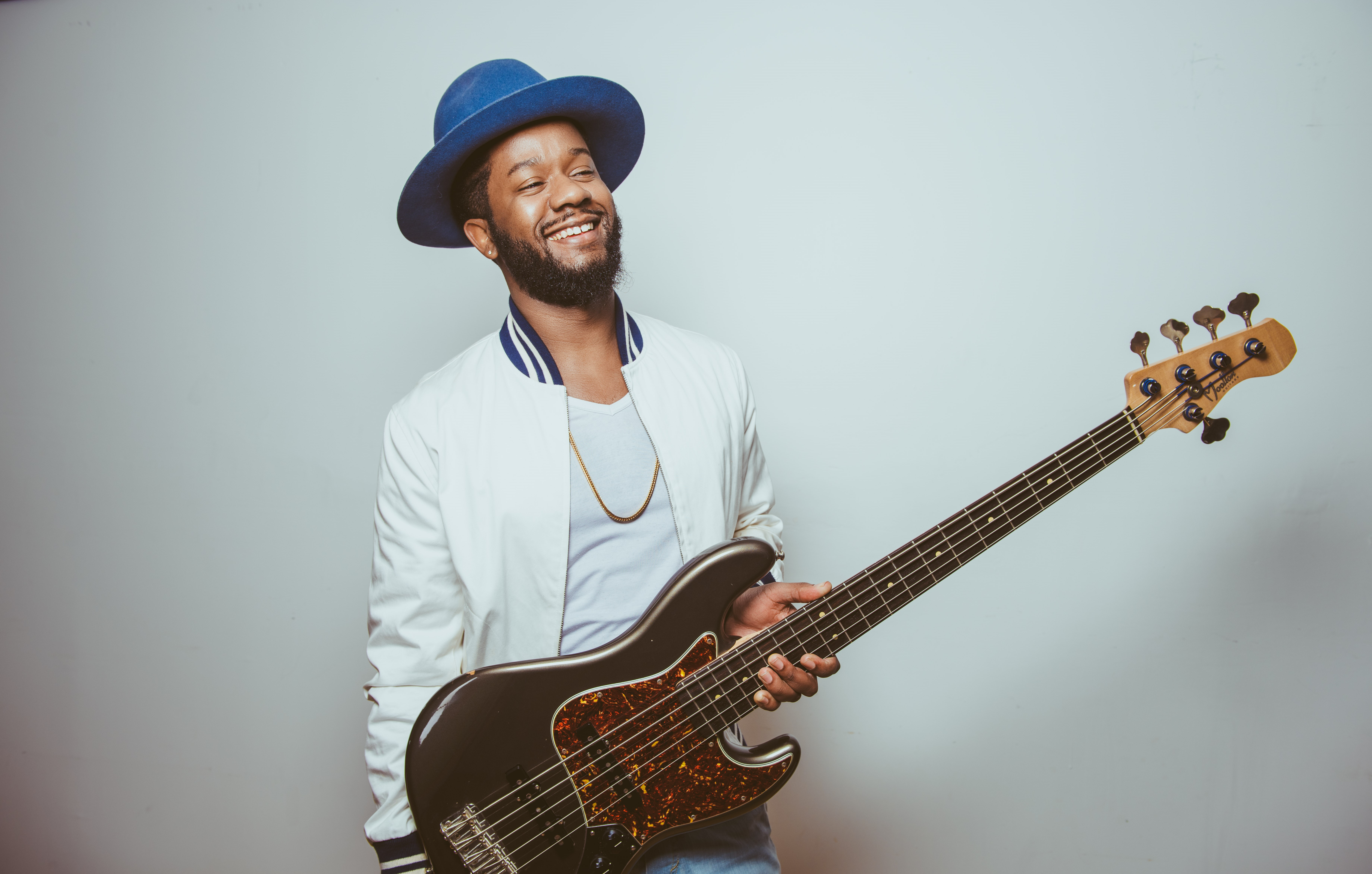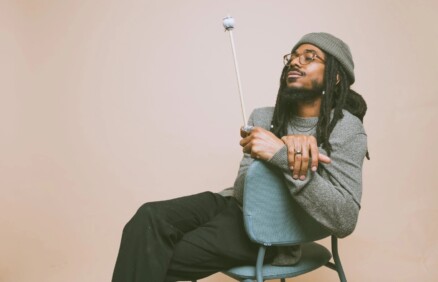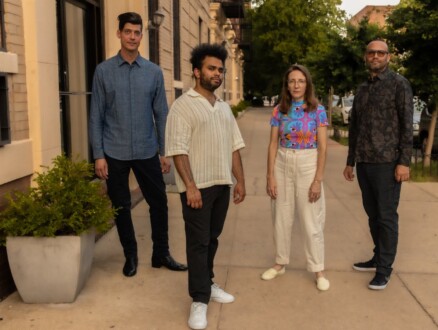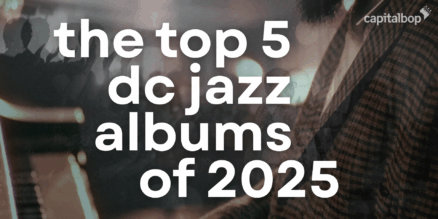Ben Williams brings cultural roots into the future on ‘Between Church & State’

Whether he’s composing, singing, producing, or jamming on upright or electric bass, Ben Williams has always been molded by his D.C. roots.
A native Washingtonian, Williams graduated from Duke Ellington School of the Arts (DESA), where he honed his jazz skills under the tutelage of Davey Yarborough. As a teen, Williams was already playing alongside D.C. heavyweights like Allyn Johnson, Nasar Abadey and Benito Gonzalez.
He broke onto the national jazz scene after winning the 2009 Thelonious Monk International Jazz Competition, and releasing his debut album, State of Art, in 2011. After graduating from Juilliard with a Masters in Jazz Studies, he then spent 15 years in New York, deepening his roots in the straight-ahead scene while simultaneously exploring new avenues in the music.
Now based in Los Angeles, Williams can be seen playing with some of the genre’s top names, from Kamasi Washington to Keyon Harrold. His sound continues to evolve as he leans more into jazz fusion and R&B-style vocal tracks.
On Friday, Williams will return home to premiere his newest project, Between Church & State, at DESA’s Main Theatre. The album, which is accompanied by a short film, is one of his most personal projects yet, as Williams explores his family roots in the South and reflects on themes of legacy, heritage and culture. It serves as a culmination of his previous projects, combining jazz improvisation with the sounds of R&B, hip-hop and gospel.
At DESA, Williams will show the film and perform the music accompanied at least in part by current Ellington students. The project’s activities were supported by Jazz Road’s Creative Residencies Grant, which Williams received in 2023.
Ahead of Friday’s premiere, Williams sat down with CapitalBop to talk about his D.C. roots, musical growth and inspirations for his newest project.
This interview has been edited for length and clarity.
CapitalBop: I want to start by talking a little bit about your upbringing in D.C. Tell me, culturally, what was that experience like and what was your entry point into music?
Ben Williams: There weren’t any professional musicians in my immediate family, but we were all very into music. We heard a lot of Marvin Gaye and Prince and Michael Jackson and all the Motown stuff. So those were, unconsciously, my first musical reference points.
I started playing piano self-taught for a number of years, when I was about eight. Then I went to Hardy Middle school, which housed an arts program called Fillmore arts, and that’s where I picked up the bass. Right at the same time I picked up the instrument I was also getting exposed to jazz.
The bug hit me. I remember my teacher gave me a cassette tape of Kind of Blue. Then the other side had a Charles Mingus record called Blues and Roots. My mind was blown.
“We’re Black, and we’re the creators of this culture.”
CB: So, since you first started playing music, jazz has been your thing?
BW: Yeah. I ended up going to Duke Ellington School of the Arts, so I got even deeper into music. It was a very immersive program. I had a lot of opportunities to just play around town. D.C. is a very musical city and has a lot of great musicians. I was already starting to pick up gigs, playing at places like HR-57 and Twins.
CB: How do you contextualize your work in the musical lineage of D.C.? In what ways is your music a reflection of the culture?
BW: The blues and our ancestral lineage, we’re all a product of that. I think it’s overlooked a lot of the time just how deep the music that comes out of D.C. is. I always say, you listen to go go – to me, that’s one of the most African-inspired popular Black music genres.
There’s a very strong sense – or maybe was – of Blackness in D.C. that we all absorbed coming up here. There’s something to be said about growing up in a culture where you don’t feel like a minority, you don’t feel like less than, you don’t feel like what you do is outside of the culture. You are the culture. My music is always a reflection of what was instilled in me in D.C., which is: we’re Black, and we’re the creators of this culture.
The blues and gospel, I look at it as two sides to the same coin, everything stemmed from there. I’m just being more intentional about it, sending that message out that this is who we are, this is where we come from – and it’s beautiful.
CB: Tell me about the name of your new album, Between Church & State. How does that reflect the larger themes of the project and also your connection to spirituality?
BW: I’m doing a short film that’s coinciding with the album, and it’s about the self-discovery of my own lineage, on both sides of my family. I’m looking at it through two sides, one being politics and the other being the Black church.
On the politics side, my mom, who’s from the south, used to work in Congress for a number of years. She worked for people like John Conyers, Charlie Rangel, Ron Dellums – the O.Gs in the Congressional Black Caucus. When she came up from the South, the experience of D.C. at that time was strong Black political movements. So, I’m talking to my mother in the film, and I have moments in the album where she’s talking about her experience and sharing knowledge.
On the church side, my paternal grandfather, he was a pretty well-known minister. He used to work with Dr. King. He had a big church in Harlem that we went up to and got to learn more about him. I’m literally learning stuff about him on film, because he passed before I was born and I never got to meet him.
The album is essentially that: Me as a Black male in this country, dealing with the world as it is now, but always looking back and trying to gather information from the previous generation about what their world was like and how they see the world now.
CB: How did you approach the creation of the album? Visually, thematically and musically, what was your vision?
BW: I started singing on my last album, “I Am A Man.” That opened up the whole hybrid of singing, songwriting, jazz composition.
This is a culmination of all the music I’ve done up to this point. I’ve gone some different creative directions in my career. From the beginning, being more of a jazz bass dude, I was always into composition; then, I started singing, and started to become a little more political.
I’ve developed all these different skill sets of being a bassist and a composer, but also a producer and a singer and songwriter. All those things are coming together into one sound now.
But it’s all very Black. Conceptually, it’s coming from more soul, R&B, even hip-hop. But musically, it is kind of more jazz and creative improvisation. Vocally, you could hear the influence of Marvin Gaye, Stevie, Prince. So it’s kind of a layered cake.
“At the end of the day, my music is about the future. It has an old soul, but … a lot of these songs are really aimed toward youth.”
CB: I Am A Man, to me, was a combination of 60s freedom songs and neo-soul, jazz and R&B. Stylistically, how would you say Between Church & State compares?
BW: I think as a singer and songwriter, I’ve gotten a lot stronger. That was really my first time singing on the album, so I’ve got more confidence. Definitely a continuation of the sound, I think it’s just been more seasoned and perfected over the years.
There’s more elements of my pre-I Am A Man music. There’s some instrumental songs and a lot of stuff that’s just compositional. It’s kind of like if the first two albums went this way and “I Am A Man” went that way, this album meets in the middle.
CB: Premiering your album at DESA is kind of a full circle moment. What does that mean to you? What’s the significance of that choice and what do you hope the students take away from that?
BW: I’m pulling a lot from themes of older generations, like the Civil Rights Movement, but still very much like in the present and the topics that we deal with now. At the end of the day, my music is about the future. It has an old soul to it, but this album, a lot of these songs are really aimed toward youth. And I think the best work I can do is to instill some of my message into them.
The grant for this project, I had to decide a place somewhere in the country that I wanted to do a residency, and I thought it’d be cool to go back to my old high school. That was the place that made me. It just felt like the best place to do it, to bring it back home. You always got to – whenever you can – bring it back home.
—
Ben Williams plays Friday at Duke Ellington School of the Arts. Tickets are $10 for high school students 18 and under, $25 general admission, and $100 VIP with a special preview reception. Tickets and more information available here. Between Church & State is not yet available to stream or pre-order online; this page will be updated when the album is publicly available.





